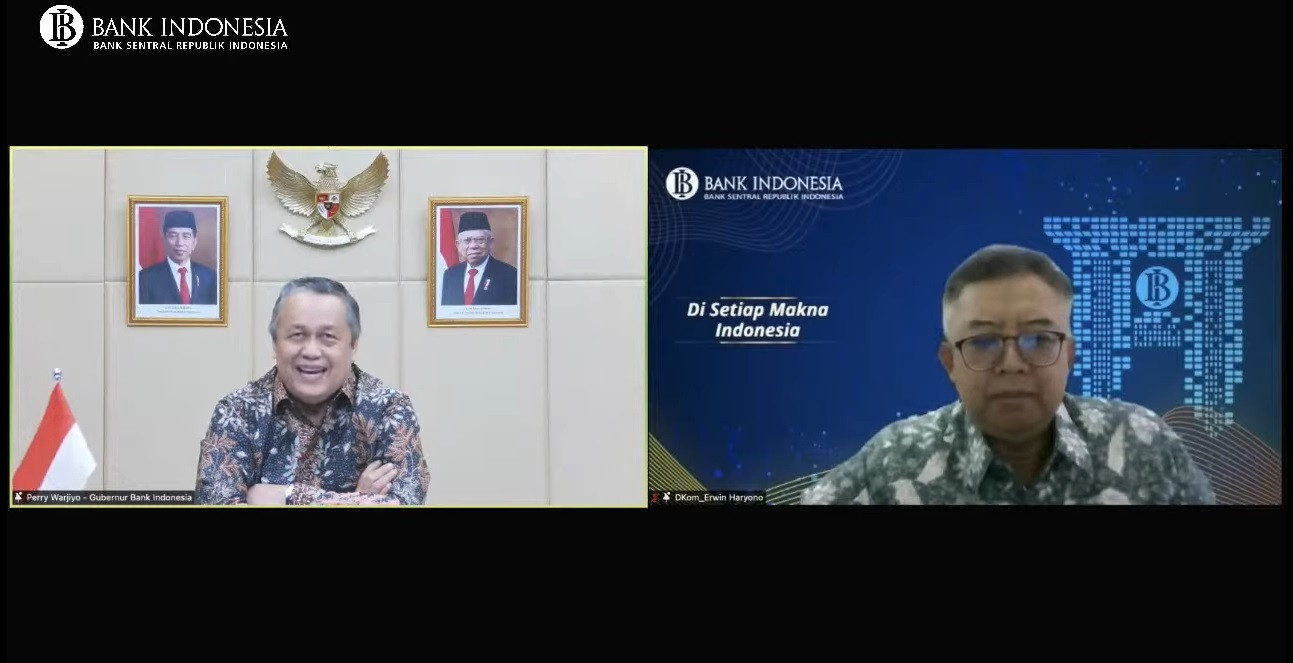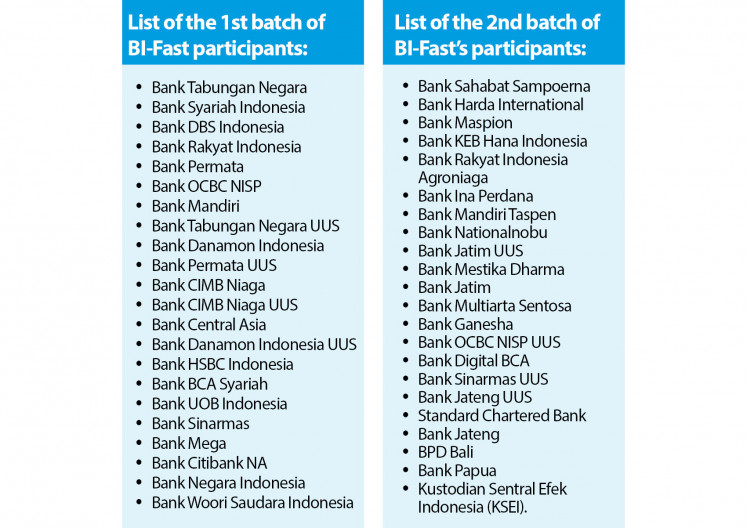Popular Reads
Top Results
Can't find what you're looking for?
View all search resultsPopular Reads
Top Results
Can't find what you're looking for?
View all search resultsBank Indonesia launching BI-Fast in December 2021 to offer fast and low-cost transactions
Change text size
Gift Premium Articles
to Anyone
B
ank Indonesia (BI), the country’s central bank, continues its innovative initiatives with the recent launch of the long-awaited BI-Fast, a real time 24/7 retail payment system infrastructure, to address public demand for fast, mobile, secure and low-cost transactions.
According to BI Governor Perry Warjiyo, BI-Fast was developed to support industrial consolidation and end-to-end integrated digital economy and finance (EKD), a national step to realize the Indonesia Payment System Blueprint (BSPI) 2025 and to respond to public demand for a fast, easy, affordable, safe and reliable payment system (CEMUMUAH).
BI-Fast was also built in lieu of the BI National Clearing System (SKNBI) that has yet to fully meet public demand for a fund transfer service because of limits in service time (in accordance with window time), which has reduced the comfort of making non-cash transactions.
“Implementing BI-Fast aligns with the direction of BI policy regarding the monetary sector, macro-prudential, payment systems, and rupiah management to support the integrated interoperable and interconnected digital ecosystem,” said Perry in a virtual press conference on October 22, 2021.
Perry said that the new BI-Fast payment system was on target to be fully operating in the second week of December, with the initial phase aimed at its individual credit transfer service. Next, BI-Fast services would be expanded in further phases, covering the service of bulk-credit, direct debit and request for payment.
BI-Fast is expected to strengthen the national retail payment system by providing an alternative to the existing national payment system infrastructure.
According to Perry, BI has set five policies to carry out BI-Fast. First, in terms of participation, BI-Fast is open to banks, non-bank institutions (LSB) and other parties as long as they meet the general and specific criteria set by BI.
Second, 22 participants will be selected for the first batch in December 2021 and 22 more for the second batch in January 2022.
Third, participants will be able to provide BI-Fast infrastructure independently, sub-independent (affiliation) or sharing among participants/3rd parties in accordance with the pertaining requirements.
Fourth, BI-Fast’s maximum amount per transaction will be capped at Rp 250 million and is subject to periodic evaluation.
Fifth, the BI-Fast price scheme from BI to participants is set at Rp 19 per transaction, and from the participants to customers is set at Rp 2,500 maximum per transaction, which is subject to periodic review.
According to Perry, BI continues to strengthen policy synergy and the implementation of BI-Fast with industrial players, within the framework of integrating the national digital economy and finance and providing the fast, easy, safe and reliable payment system to accelerate economic recovery, spur economic growth and financial inclusion.
Perry said that the current movement of economic digitalization “has permeated through almost every aspect of our lives. Consumption patterns have shifted to the use of digital platforms and require a payment method that is mobile, fast, affordable and, at the same time, safe.”
The unforeseen and prolonged COVID-19 pandemic has created both new challenges and opportunities. One of the opportunities is wider digitalization, believed to be the key to accelerating the national economic recovery and at the same time spurring higher economic growth.
To respond to the digitalization challenges in all aspects of people’s lives, Bank Indonesia issued the BSPI 2025 in 2019. In the BSPI 2025, retail payment-system digital innovation is directed toward CEMUMUAH payment-system services in the future, BI-Fast will become the backbone of the future retail payment system infrastructure that will accelerate payments by using various instruments and channels that are real-time, safe, easy and operate around the clock.
Criteria for BI-Fast participation
The general criteria for participation include meeting the requirements on institutions, financial performance and information system capability. Participants are also required to meet specific criteria for the 3Cs, namely contribution (contribution to digital economy and finance), capability (financial capability and liquidity) and collaboration (support to BI policy in the future).
“Participants should also meet the criteria for being a “champion on readiness” which is measured by, among others, readiness related to people, process, technology and as a fund manager,” Perry said.
Based on an assessment of these participation criteria and the commitment and readiness of participant candidates, including a consideration of people, process and technology, BI has selected 22 participants for the first batch in December 2021 (see list below) and 22 further participants for the second batch in January 2022 (see list below).
Bank Indonesia is also open to other candidates who wish to join BI-Fast.
Despite being more affordable, Perry said that the tariff policy would not lead banks’ non-interest income, such as fee-based income, to drop.
Perry was confident that the increasingly affordable tariff would drive more customers to make transactions more frequently, which would lead to an increase in the bank’s transaction volume. “When the value of transactions goes up, the income will also rise because the income comes from how frequent they make transactions and the price,” he said.
Apart from the increase in transactions, Perry said the new retail payment system would allow people who previously had no access to banking to be served by BI-Fast. “So, there will potentially be new customers from new circles gaining access to the financial service,” he said.
The transaction at the BI-Fast is settled real time 24/7. “Rp 2,500 is the maximum transaction charge that we set for participants. But if participants can offer lower to customers, please do. We fully support this,” he said.
“The increase in the number of participating banks that offer lower prices will spur the increase in volume,” he said.
“In the digital world, size and volume are far more important. When a business is increasing in size, the price will be increasingly efficient and increasingly affordable. That’s the essence of digital business,” he said.
Although joining BI-Fast is not mandatory for participants, BI encourages all participant to join so they can reap the benefits of BI-Fast’s added value services, which are customer centric, to meet the public need for more efficient and affordable digital transactions. However, considering the level of readiness and need from the diverse participants, they are able to set their own timeline when making their proposal.
When it comes to infrastructure, BI provides a connector for all participant candidates to connect them to the BI-Fast system. It is necessary for participants to prepare the infrastructure when applying for the connector for the BI-Fast system.
An independent participant can provide BI-Fast infrastructure autonomously, while those who are sub-independent (affiliation) can provide the infrastructure through collaboration with other participants under one company group. For a participant sharing with another participant/third party, the infrastructure is prepared through the cooperation between groups or a third party.
According to Perry, providers of sharing infrastructure are obliged to meet the criteria, which among others, relates to the institution (including credibility and expertise etc.), finance (information system capability - such as a business continuity plan), information technology control (security standard) and governance and risk management.
Looking ahead, Perry said that banks eager to join the BI-Fast system can nominate themselves and if they meet the requirements that BI has set, the central bank will add them to the BI-Fast system periodically.
It is expected the price that has been set for both participants and customers could provide a space for the continuity of the payment system industry and, at the same time, provide public infrastructure that is efficient and supports the digital economy and finance.
. (Courtesy of BI/.)Benefits for customers
According to Perry, in setting the value of transactions using BI-Fast Payment, BI considers the principles of efficiency and effectiveness, innovation and competition, inclusivity and how to serve customers well, including security and risk mitigation.
The maximum amount per transaction by using BI-Fast Payment system for the initial phase of implementation in December is set at Rp 250 million per transaction, which is subject to periodic evaluation.
“BI-Fast is for retail transaction from Rp 0 to Rp 250 million, while real-time gross settlement (RTGS) is set above Rp 100 million” he said.
Thereby, Perry said the public had options, whether they chose the RTGS or BI-Fast Payment system. “The public can choose which one meets their needs,” he said.
Perry explained that currently, the SKNBI and BI-RTGS payment services were confined to limited operating hours on weekdays, capped at a certain value of transaction and were also confined in terms of access to the e-channels of mobile and internet banking.
“BI-Fast, however, is complete with a proxy address feature, enabling customers to also use their mobile phone number or e-mail address as an alternative account number,” he said.
On top of that, with the maximum transaction capped at Rp 250 million, it is far higher compared with online transaction caps, which are commonly capped at Rp 25 million per transaction.
In the initial phase, BI-Fast service can be accessed through mobile channels, the internet or at the counter. Moving ahead, BI-Fast will also be developed to make transaction through other channels, such as QRIS, ATM and EDC.











